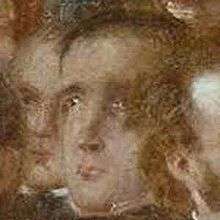Elon Galusha

| Part of a series on |
| Adventism |
|---|
 |
| Background and history |
| Biographies |
| Theology |
| Denominations |
|
Elon Galusha (June 18, 1790 – January 6, 1856) was a lawyer and Baptist preacher who was active in reform activities of the early 19th century in New York. He was the son of Jonas Galusha, the 6th and 8th governor of Vermont. He also adopted and promoted the teachings of William Miller.
Biography
Galusha was born June 18, 1790 in Shaftsbury, Vermont.[1] His father was Jonas Galusha, the governor of Vermont. Galusha received an M. A. from the University of Vermont in 1816, and an M. A. from Brown University in 1820, though he never took a college course.[1]
Galusha died January 6, 1856 in Lockport, New York.[2]
Abolitionist activities

- ^ The Anti-Slavery Society Convention, 1840, Benjamin Robert Haydon, 1841, National Portrait Gallery, London, NPG599, Given by British and Foreign Anti-Slavery Society in 1880
Galusha took a firm stance against slavery. He served as the first president of the Baptist Anti-Slavery Society.[3] He promoted the Liberty Party and preached about the evils of slavery.[4] Following His withdrawal from the Baptist denomination, he hosted abolitionist meetings at his church in Lockport.[5]
Millerite connection
Galusha leaned toward a premillennial understanding of Bible prophecy. After personal deliberation, and having read William Miller's Lectures, Galusha joined the Millerite movement wholeheartedly under the influence of a fellow preacher, Nathaniel N. Whiting.[6]
Galusha served as president of the Albany Conference on April 29, 1845, following the Great Disappointment.[7]
References
- 1 2 William B. Sprague, Annals of the American Pulpit, or, Commemorative notices of distinguished American clergymen of various denominations : from the early settlement of the country to the close of the year eighteen hundred and fifty-five : with historical introductions, vol. 6 (Baptist) (New York : R. Carter and Brothers, 1860), p. 669
- ↑ William Cathcart, The Baptist Encyclopedia, vol. 1 (Paris, AK: The Baptist Standard Bearer, Inc., 2001), p. 432
- ↑ Grosvenor, Cyrus Pitt, Richard Fuller, and Elon Galusha. Baptist Anti-Slavery Correspondent. Worcester, Mass: Executive Committee of the American Baptist Anti-Slavery Convention, 1841. p. 2
- ↑ Douglas M. Strong, Perfectionist Politics: Abolitionism and the Religious Tensions of American Democracy, (Syracuse, NY: Syracuse University Press, 2001), p. 111
- ↑ Douglas M. Strong, Perfectionist Politics: Abolitionism and the Religious Tensions of American Democracy, (Syracuse, NY: Syracuse University Press, 2001), p. 113
- ↑ Elon Galusha, Address, of Elder Elon Galusha, with Reasons for Believing Christ’s Second Coming, at Hand (Rochester: Erastus Shepard, 1844) p. 4
- ↑ Isaac Wellcome, History of the Second Advent Message and Mission, Doctrine and People, (Yarmouth, ME:I. C. Wellcome, 1874), p. 415
External links
Grosvenor, Cyrus Pitt, Richard Fuller, and Elon Galusha. Baptist Anti-Slavery Correspondent. Worcester, Mass: Executive Committee of the American Baptist Anti-Slavery Convention, 1841.
Elon Galusha, Address, of Elder Elon Galusha, with Reasons for Believing Christ’s Second Coming, at Hand. Rochester: Erastus Shepard, 1844.